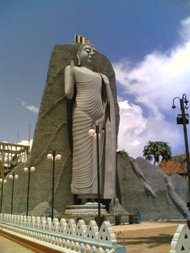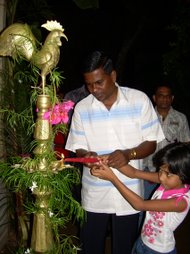-The Nation' News
Resolving Lanka’s ethnic issue still a distant dream
Playing his best role as Master in the fine art of doublespeak, President Rajapaksa explains his two pronged strategy of simultaneously pursuing the diametrically opposed goals of war and peace to audiences at the UN General Assembly
“Any negotiated settlement to the ethnic issue would not be worth the paper written on, unless terrorism is eliminated by military means” – Gotabhaya Rajapaksa, Defence Secretary- on the eve of the UN sessions. His statement was in sharp contrast to what his brother President Rajapaksa said in his address to the UN assembly when he emphasized that, “ his regime was committed to a negotiated and honourable settlement of the ethnic war”
The fine art of doublespeak came into vogue last week as both the government and the opposition grappled with contentious issues, possibly with the same objective-that of securing power for themselves in the immediate future.
The government’s posturing was enacted in far away New York where President Mahinda Rajapaksa was attending the 62nd General Assembly of the United Nations. Although the state media made much of the fact that the President was one of the few heads of state speaking on the inaugural day of the sessions, Rajapakse’s attention lay elsewhere: on the many human rights groups keen to embarrass him on the world’s stage.
At his address to the United Nations itself, Rajapaksa was not in a compromising mood. Speaking in Sinhala to a sparse audience, he declared that terrorism anywhere is terrorism and that there was no such thing as ‘good’ terrorism. He made the case that his regime had ‘liberated’ the east of the country but stopped short of asserting that he would opt to do the same for the north.
Rajapaksa did say however that his government’s thrust in the East was part and parcel of a strategy to convince the Liberation Tigers of Tamil Eelam (LTTE) that the latter could not win a war against the military. He emphasized that his regime was committed to a negotiated and honourable settlement of the ethnic issue.
Even if that was for the consumption of international audiences who were keen to ascertain the President’s thinking, the real doublespeak came in the behind- the scenes meetings, where the President was busy repairing the damage caused by months of negative publicity-some of it due to his own government’s bungling, the rest of it engineered by LTTE propaganda.
There were meetings with United Nations General Secretary Ban Ki Moon as well as Indian Foreign Minister Pranab Mukherjee, but the icing on the cake was meeting Eric Solheim, formerly the chief broker of talks with the LTTE, and now Norway’s Minister of International Development. It was the perfect photo opportunity for Rajapaksa to smile for the cameras and announce to the world that the government is willing to talk to the Tigers yet again!
Then there was Sri Lanka’s expensive and expansive Foreign Minister, the much travelled Rohitha Bogollagama, reiterating that Sri Lanka was committed firmly to a negotiated settlement of the ethnic war, pooh-poohing any suggestions that a military option was being pursued.
Of course, all this must be taken with a pinch of salt because the ‘ground situation’ as they say, is somewhat different from what is said and done in the plush conference halls in New York. And proof of that came from none other than Defence Secretary and presidential sibling Gotabhaya Rajapaksa.
On the eve of the UN sessions, Rajapaksa (Jnr.) was to say that any negotiated settlement to the ethnic issue would not be worth the paper it is written on, unless terrorism is eliminated by military means. Such a sentiment would enjoy considerable support in the south of the country, in the context of the now redundant Ceasefire Agreement (CFA) entered into by the LTTE and the Ranil Wickremesinghe administration.
So, that leaves us with the all important question: what exactly is the government’s policy vis-a-vis the ethnic crisis? Will it attempt to stamp out terrorism-and therefore the LTTE militarily, and then opt to negotiate? Is this a practical option to pursue? Or, will it adopt a two-pronged strategy of aggressively pursuing war while adopting the peace stance at international fora?
The government itself is probably searching for answers to this dilemma. The hawks in the establishment would dearly love to annihilate the LTTE, but their hands are tied due to international pressure, the lack of funds for military spending, and the sheer enormity of the task. Nevertheless, this seems to be the more favoured option, at least at this moment in time.
If that was the poser for the Rajapaksa regime, even the opposition United National Party (UNP) appears to be in a quandary about its stance on a negotiated settlement. This caught the limelight when UNP stalwart Ravi Karunanayake said this week, that his party was considering options other than a federal solution to devolving power to the minorities, under any proposed power sharing agreement.
This statement was significant for several reasons. Firstly, although Karunanayake says the UNP is willing to consider ‘other options’, he does not say whether these options offer more or less devolution than the federal model. Secondly, these sentiments come from Karunanayake, and not from the leadership of the UNP or in the form of an official communiqué from the party.
Now, it is well known that the UNP is assiduously courting the leftist Janatha Vimukthi Peramuna (JVP) these days, and that the JVP is playing hard to get, but making noises to the effect that it could consider joining forces with the UNP, if the latter is more flexible in its policy towards the national question. It is also known that the ‘F’ word, federalism, is anathema to the JVP.
Therefore, Karunanayake’s statement appears to be an attempt by the UNP to test the waters with the leftists. But already, it has sent alarm bells ringing with the much respected moderate Tamil politician, V. Anandasangaree calling on the UNP to be cautious in its decision making.
It would be a sad day for this country, if the UNP which in recent times has steadfastly stood for negotiated peace through maximum devolution of power to the minorities, was to now suddenly embrace a more nationalist stance solely with the short term objective of coming to power. It would be an extremely short sighted move that could prove disastrous for the country in the long run.
Both the government and the opposition therefore appear to be playing to the gallery of public opinion, because both factions are keen to secure power: the government, to retain it in the face of a surge of unpopularity brought about by economic burdens being heaped on the public, and the opposition eager to regain control after being a dozen years out of office, and sensing a window of opportunity.
The net result though, is that any resolution of Sri Lanka’s burning issue of ethnic division appears to be as distant as ever.
****





No comments:
Post a Comment